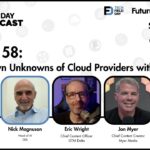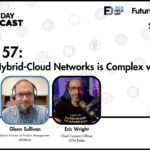Your Internet Application is full of unknowns, which will affect its performance and availability for your customers. This episode of the Tech Field Day Podcast features Catchpoint CEO and co-founder Mehdi Daoudi, Eric Wright, Jon Myer, and Alastair Cooke. Internet applications are seldom self-contained, relying on other web services for specialized functions and needing responses from the services before a final response to a user. Functions such as DDoS protection, tracking, embedded advertising, and other valuable services enable faster application feature development, but at what cost? Any delayed response from these services can slow down your application for your users, leading to dissatisfaction, even when your servers perform beautifully. Remember that the services you choose to use may, in turn, use other external services. Catchpoint champions user-centric monitoring and Internet Performance Monitoring (IPM) to complement existing APM tools. Visibility of issues outside your data center is vital to identifying issues before they become helpdesk tickets or application outages. If this Tech Field Day Podcast episode piques your interest, watch the Catchpoint appearance at Cloud Field Day on YouTube.
Managing Hybrid Cloud Networks Complexity with Infoblox
Managing hybrid-cloud networks is complex due to differing architectures and naming between on-premises and the multiple public cloud platforms. This Tech Field Day Podcast episode features Glenn Sullivan, Senior Director of Product Management at Infoblox, Eric Wright, and Alastair Cooke. Each public cloud has a unique management console and network management paradigm; none provides deep integration with each other or with on-premises networking. It is left to individual customers to assemble a jigsaw of pieces into a coherent whole. Customers may not plan to use multiple public clouds, but through different project requirements or mergers and acquisitions, most large organizations find themselves in a hybrid multi-cloud environment. Combining fast-changing public cloud applications with on-premises applications further complicates network management, requiring an automation-based approach. Infoblox UDDI (Universal DNS, DHCP, and IPAM) provides a consistent, automatable interface to manage and operate basic network infrastructure across all enterprise locations. UDDI includes bi-directional operation where changes using cloud-native consoles are visible in UDDI and vice versa.
Catchpoint at Cloud Field Day 22: Why IPM Matters
Eric Wright covers Catchpoint’s presentation at Cloud Field Day 22, where they emphasized the significance of Internet Performance Monitoring (IPM) in maintaining efficient and reliable online services. The overview provided insight into how Catchpoint’s technologies enable businesses to monitor and optimize their internet services effectively. For additional coverage of Cloud Field Day 22, watch Eric’s blog.
Operations, Code or Die
Following a presentation by Ned Bellavance at Cloud Field Day 22, Alastair Cooke discusses the essential convergence of operations and coding, highlighting how today’s IT professionals must adapt to remain relevant in an evolving technology landscape. He asserts that mastery of both fields is crucial for effectively managing modern infrastructure and applications.
HYCU + Dell + Excitement at Tech Field Day CFD22
Eric Wright discusses the collaboration between HYCU and Dell Technologies, highlighting their innovative data protection solutions at Cloud Field Day 22. This partnership demonstrates a significant step forward in streamlining data management and security for cloud environments, providing advanced tools and methodologies. Additional insights and coverage on Cloud Field Day 22 by Eric Wright can be found on the DiscoPosse site.
Fortinet at CFD22: Solving a complex set of security challenges
Eric Wright discusses Fortinet’s presentation at Cloud Field Day 22, emphasizing their innovative approach to tackling complex security issues in cloud environments. The session highlighted how Fortinet’s solutions are designed to enhance security without compromising network performance. For additional insights on Cloud Field Day 22, visit DiscoPosse.
Trade Restrictions will Allow China to Out Innovate US AI Companies
China will out-innovate US AI companies because of the trade restrictions imposed on it. In this episode of the Tech Field Day Podcast features Ned Bellavance, Eric Wright, Justin Warren, and Alastair Cooke. They say that necessity is the mother of invention. US restrictions on AI chip exports have driven China to develop a sophisticated generative AI solution with older technology. Are the restrictions making Chinese companies more innovative than their US counterparts? DeepSeek was trained with far fewer resources than previous Large Language Models. On the other hand, DeepSeek isn’t groundbreaking, apart from the apparent censorship around taboo topics to the Chinese establishment.
Selector AI – Observability + AIOps at Cloud Field Day 22
Eric Wright provides an insightful overview of Selector AI’s innovative approach, combining observability with AIOps, following their presentation at Cloud Field Day 22. The article highlights how Selector AI is enhancing IT operations through advanced data analytics and machine learning techniques. For additional coverage of Cloud Field Day 22, follow Eric’s posts!
Infoblox – Solving the DDI problem
Eric Wright provides a detailed overview of how Infoblox addresses the unique challenges of DDI (DNS, DHCP, and IP address management), enhancing network reliability and security. His analysis highlights the pivotal role Infoblox plays in simplifying complex enterprise network environments through comprehensive management solutions. For additional insights and coverage on Cloud Field Day 22, visit Eric’s website.
Cloud Field Day 18: After-Action Perspective From the Delegates
We loved Nathan Bennett’s group Cloud Field Day after-action report video and wrote up an article to go with it at Gestalt IT. The event offered a platform for tech companies to showcase their developments and gain feedback from our delegates. Juniper Networks presenting their AI integration into Apstra, while Mezmo impressed with its telemetry capabilities and user-friendly interface. Long-standing industry player, VMware, was noted for its adaptability in the multi-cloud environment, proving that the evolving tech landscape remains exciting and innovative. Get the delegate reaction to all the presentations in this video!
Cloud Field Day 18 – After Action Report
This “after-action report” is a YouTube video featuring a group of Cloud Field Day delegates discussing the presentations and content from our recent event. Organized by Nathan Bennett, these videos give an immediate and unvarnished look at the presentations.
Juniper Networks at Cloud Field Day 18
At Cloud Field Day this week, Juniper Networks demonstrated their innovative approach towards data center and cloud networking, with an emphasis on their 2020 acquisition of Apstra. The technology presents automation solutions that reduce risk of misconfiguration and speed up the work process for network operators, using features such as intent-based networking, AI-driven insights, and application awareness. According to Eric Wright, the presentations underscored the significance of automation and data-driven optimization in achieving reliable, consistent, and resilient network management, especially in the dynamically evolving landscape of AI and ML.
VMware at Cloud Field Day 18
Eric Wright provides an extensive recap of VMware’s appearance at Cloud Field Day 18. The presentation focused on application centricity, with VMware showcasing its Tanzu Intelligence tools designed to optimize processes like cloud migration, application and infrastructure observability, and cost management. Eric praises VMware’s efforts to consolidate functions and create a unified user experience in addressing modern application infrastructure.
WEKA at Cloud Field Day 18
Eric Wright explores the benefits and functionalities of the WEKA Data Platform, a system born in 2017 that is performance-oriented and cost-optimized for major cloud providers including AWS, Azure, Google Cloud, and Oracle Cloud. The platform stands out for being user-friendly, highly resilient, and providing a hybrid model for both private and cloud hosting. Furthermore, it’s designed to efficiently handle AI and ML workloads, offers attractive features for data enthusiasts such as snapshot capabilities, and provides remarkable storage over standard protocols to multiple clouds.
AMD Is Doing Great Things at Cloud Field Day 18
In a this post, Eric Wright reviews AMD’s innovations and their impact on cloud applications, particularly focusing on the industry pioneer’s EPYC processors. He praises AMD’s cloud-centric approach, their Dom0 concept for efficient resource offloading, and their chiplet architecture that contributes to system optimization. By delivering high-performance, efficient usage of resources, and maintaining a cost-effective balance, AMD continues to push advancements in cloud technology.
Prosimo Is Proudly Back at Cloud Field Day 18
Eric Wright discusses the innovative approach of Prosimo, a platform that facilitates multi-cloud and multi-platform interconnectivity. The article emphasizes Prosimo’s ability to simplify cloud networking complexities. Wright appreciates Prosimo’s ability to function in both new and existing environments, its provision of unified solutions, and its ability to make changes safely and efficiently while providing clear visibility to the user.
Introducing Mezmo at Cloud Field Day 18
Eric Wright provides an in-depth look at Mezmo’s telemetry pipeline solution, which was unveiled at Cloud Field Day 18. Mezmo, formerly known as LogDNA, collects, transforms, and routes telemetry data to understand and optimize data, thereby controlling costs and enhancing actionability. The blog particularly praises Mezmo’s user-friendly interface and their ability to make log data more valuable by enriching it with context.
Mind the Gap Between Hyperscale and Enterprise IT
Stephen Foskett and Cloud Field Day delegates Allyson Klein, Eric Wright, and Nathan Bennett examine the gap between hypserscale and enterprise IT in this episode of the On-Premise IT podcast. The episode’s guests scrutinize the disparities across numerous areas, including AI and sustainability. They propose that these differences stem from the influence hyperscalers have on technological developments and discuss the importance of bridging the hypserscale-enterprise IT gap.
JetStream Software at Cloud Field Day 17
In this article, Eric Wright reacts to the JetStream Software presentation from Cloud Field Day 17. JetStream Software showcased its disaster recovery (DR) solution for VMware, delivering a DBaaS platform that ensures extremely low recovery point objectives (RPO) and recovery time objectives (RTO). The architecture of the platform depends on JetStream Management Server appliance, IO filters, DR Replication Virtual Appliance, and object storage. Continuous failover facilitates near-zero RTO, whereas runbooks initiate recovery sequences scheduled on a manual, automated, or timely basis while allowing control to switch recovery site protection to an alternate site to minimize operational costs.
Couchbase at Cloud Field Day 17
In this article, Eric Wright reacts to the Couchbase presentation from Cloud Field Day 17. Couchbase Capella is a promising database-as-a-service (DBaaS) platform for developers majorly focused on NoSQL. The platform targets performance and scalability needs while providing a flexible, unified and multi-tenant environment for all data services. Couchbase Capella is a cloud database platform for modern applications and showcases exceptional performance and functionality in a simple, fast, and affordable manner.









